action medeor | “We do not grow vegetables because it requires irrigation and steady watering”, says a smallholder living in a community located in the region of Hiraan, Somalia. Besides the continuing conflict affecting the country since 1991, many regions in Somalia suffer from reoccurring weather extremes like droughts that have direct impact on household’s food security. Food insecurity resulting in poor nutrition can have severe impact on a person’s health status and indirectly influences a countries economic development. Therefore, action medeor supports its local partner WARDI that is currently implementing two food security projects in Somalia. The aim is to strengthen the resilience of smallholders against climatic shocks and to improve the nutrition and health of their families.
Malnutrition in all its forms is the most important risk factor for death and disease in the world. It affects the function and recovery of every organ system and can lead to severe health problems. Undernutrition and micronutrient deficiencies, two different forms of malnutrition, are especially critical for vulnerable infants and young children. They require energy- and nutrient-dense foods to grow and to ensure a good physical and mental development. The vicious cycle of childhood infections and undernutrition reflects the negative impacts poor nutrition can have: undernourished children are at increased risk of infection, while chronic or reoccurring infections often lead to undernutrition. This vicious cycle affects not only the mental and physical development of children but also has a severe impact on the children’s future life.
The vicious cycle of undernutrition and infectious disease (Source: VioICE)
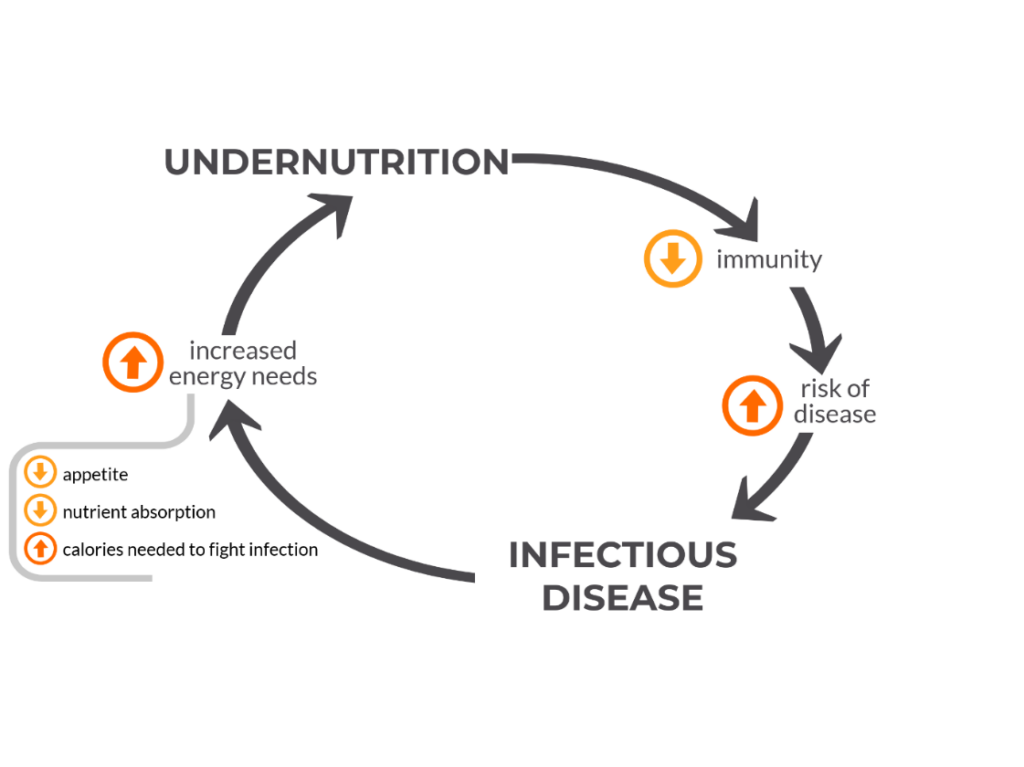
Especially nutrition interventions aiming at the first 1.000 days of children’s life (from conception through the first two years of life) can have a positive impact on the health of children. So-called nutrition-specific interventions and programs thereby directly address immediate causes of malnutrition. Intervention activities include e.g. micronutrient-supplementation and supplementary feeding for acute cases; the promotion of early initiation of exclusive breastfeeding or improving mothers’ knowledge on appropriate complementary feeding practices. However, nutrition-specific interventions alone cannot eliminate the problem of malnutrition.
Besides nutrition-specific interventions, also nutrition-sensitive interventions and programs can be helpful to improve nutrition by enhancing the household and community environment in which children grow and develop. For example, nutrition-sensitive agriculture can have a positive nutritional impact by increasing the quality and availability of agricultural products, as well as the quality of food in terms of diversity, nutrient content and safety. Other nutrition-sensitive approaches include the strengthening of the economic situation, providing livelihoods or the implementation of WASH activities.
Improving food security in Somalia
action medeor has been working trustfully with its local, Somali partner WARDI Relief and Development Initiatives since 2011. At that time there was a famine in southern Somalia, affecting some 3.1 million people. Unfortunately, the food security situation in the country is still critical today. Due to extreme weather conditions – from floods and heavy rains during rainy seasons to longer dry periods during the harvest, the recent plague of locusts and now the pandemic of COVID-19 – the situation in 2020 is very tense and likely to worsen.
Most farmers in targeted villages have little knowledge about modern farming methods, plant- and soil conservation as well as disaster risk reduction measures. This has led to high seasonal food insecurity, dependence on short-term assistance and weakened resilience. In addition, health is rather poor in all targeted areas. For instance, applied hygiene and nutrition practices in children are deficient and many areas are experiencing an increased risk of disease and high rates of malnutrition among children under five years of age.
The project concept of WARDI aims at improving the health and nutritional situation of smallholder families in different regions and combines nutrition-specific and nutrition-sensitive intervention activities. A combination of diverse trainings and agricultural inputs contributes to increased food and nutrition security – nutrition-sensitive agriculture is a key priority in the projects.
The project activities include the support of smallholder families with seeds, agricultural tools and animals as well as diverse trainings on topics such as improved farming techniques, livestock farming and disaster risk reduction. By those activities, yields can be increased in order to generate more and diverse food for the families but also for the villages if surpluses are sold.
Other than supporting farmers with farming input and capacity to increase their production, the project also engages women with counselling sessions on infant feeding, malnutrition screenings and cooking demonstrations to make mothers active participants in the fight against acute childhood malnutrition, which is a major public health problem in the communities. As clearly stated by the mothers in the support groups, this strategy is giving them the ability to take control of their children’s health. Geni Salad Mumin, 36 years of age and a lead mother in the small village of Dolo gaal puts it more candidly: ‘The mothers support group has been very helpful in our village. Together with other women who have children below two years, we are able to meet on weekly basis and discuss several issues related to our children’s and our own health. We are able to learn how best to breastfeed our children, how to make delicious and quality foods. As you can see (pointing to her daughter), our children are much healthier and my daughter Kawthar who is now four month old has not been sick since she was born. In my other six children, I used to have frequent diarrhoea and poor health in general.”
In 2019, 36 counselling sessions were conducted in six villages around Beletweyn town with a total of 150 mothers and their children under 24 months participating. The focus of the cooking demonstration lies on the quality of food and the importance of a diverse diet for a good development of the children. In addition to the inputs on nutrition, food was cooked and eaten together. It looks like everyone enjoyed it!
………………..
Authors: Jana Niemann (nutritionist, action medeor), Charlotte Sielicki (project manager, action medeor) and Abukar Mohamed (health and nutrition officer, WARDI)
Contribution by action medeor to the Annual Report 2019 of Medicus Mundi International
References:
- Global nutrition report 2018: https://globalnutritionreport.org/reports/global-nutrition-report-2018/executive-summary/
- Impact of malnutrition on childhood infections: https://www.ncbi.nlm.nih.gov/pmc/articles/PMC6037284/
- Vicious cycle of undernutrition and childhood infections: https://immunizationevidence.org/featured_issues/undernutrition-and-infectious-disease/
- Nutrition-sensitive interventions and programs: http://a4nh.cgiar.org/files/2013/06/NutritionSensitiveInterventionsAndPrograms.pdf
- Nutrition-sensitive agriculture: http://www.fao.org/3/a-as601e.pdf
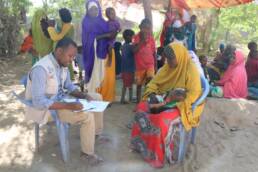
Photo: Abukar Mohamed, a Health and Nutrition Coordinator from WARDI interviewing a mother. (Picture taken by ©WARDI)
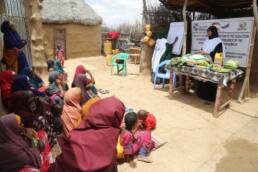
Photo: Mothers and children attending a cooking demonstration as part of IYCF training. (Picture taken by ©WARDI)
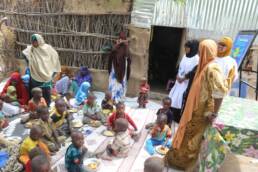
Photo: Children after cooking demonstration enjoying a delicious and nutritious meal. (Picture taken by ©WARDI)
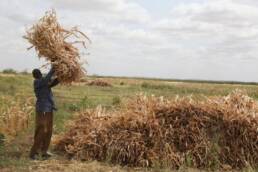
Photo: Farmer after maize harvest. The stems are used as fodder. (Picture taken by ©WARDI)
